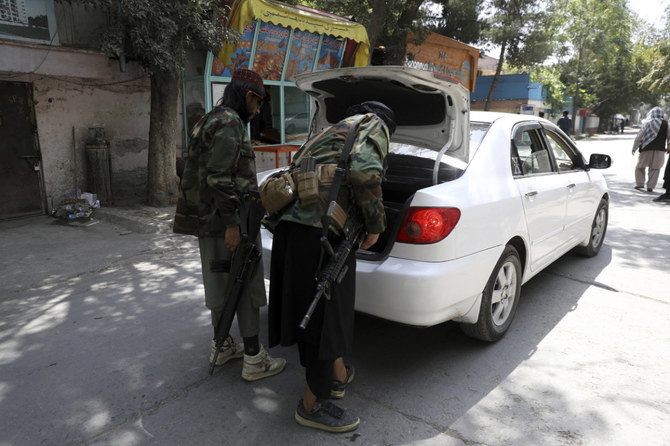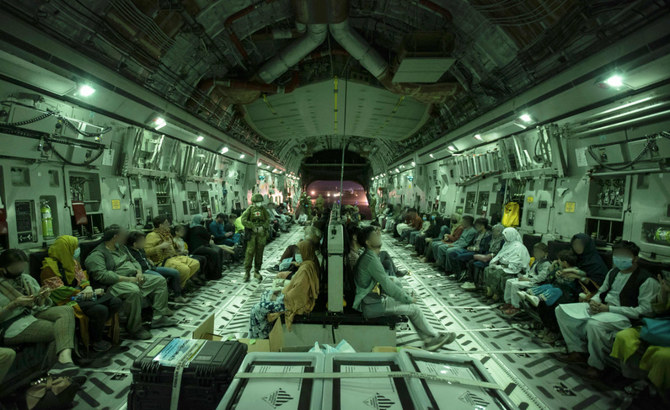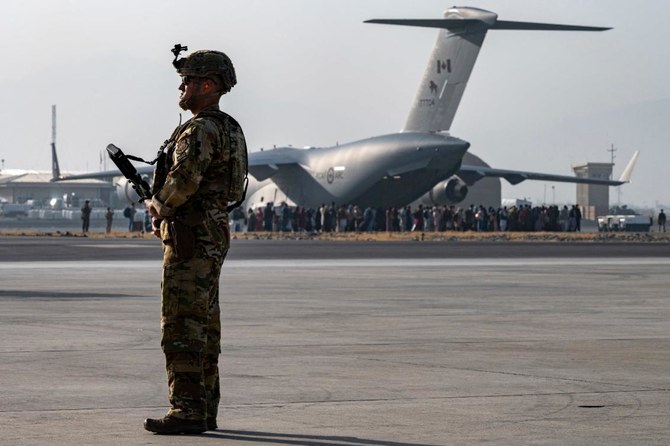KABUL: At least seven Afghans died in a panicked crush of people trying to enter Kabul’s international airport, the British military said Sunday, as thousands were still trying to flee the country a week after the Taliban takeover.
The victims may have been trampled, suffocated or suffered heart attacks as Taliban fighters fired into the air to try to drive back the crowds. Soldiers covered several corpses in white clothing.
The latest fatalities has brought the death toll from a week of chaos at Kabul airport to more than 20.
Kabul’s airport, now one of the only routes out of the country, has seen days of chaos since the Taliban entered the capital on Aug. 15. Several Afghans plunged to their deaths after clinging to a US military cargo plane as it took off, some of the seven killed on Aug. 16.
Western troops in full combat gear tried to control the throngs on Sunday. As temperatures rose to 34C, they sprayed water over the crowd, handed out bottled water and removed people who were clearly ill. Other troops stood on concrete barriers, trying to calm the crowd.
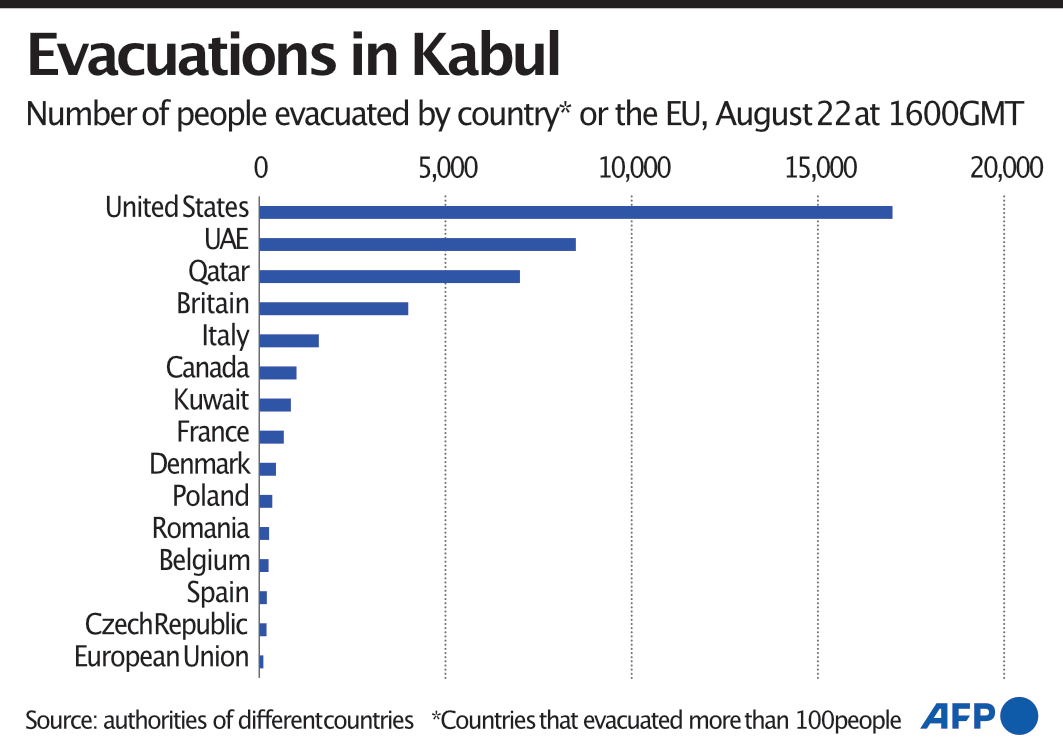
“The situation at Kabul airport remains extremely challenging and unpredictable,” a NATO official said.One family told Arab News of “bullets raining on the tarmac” as they tried to flee. Zarmina, her husband, and their eight-month-old son and five-year-old daughter spent two days trying to get into the airport before giving up and returning home.
“Bullets were landing left and right,” said Zarmina, who works for a Western organization and is eligible to be evacuated. “They even used tear gas to scatter the crowd, but no use. The baby was screaming, some people got injured before our eyes, we thought to leave before being killed or injured.
“I am too exhausted to speak because of what we went through. It is not worth going this way unless they sort out the growing chaos. You might get killed here at the airport, which is the most violent place in Afghanistan now.”
US military blamed
The Taliban blame the chaotic evacuation on the US military, saying there’s no need for Afghans to fear them, even though their fighters shoot into the air and beat people with batons as they try to control the crowds outside the airport.“The US is responsible for what is going on at the airport,” Taliban spokesman Bilal Karimi told Arab News.
“When it cannot control the situation and the evacuation, why did it create hope for so many people? We have said these people will face no harm as we have announced an amnesty.”
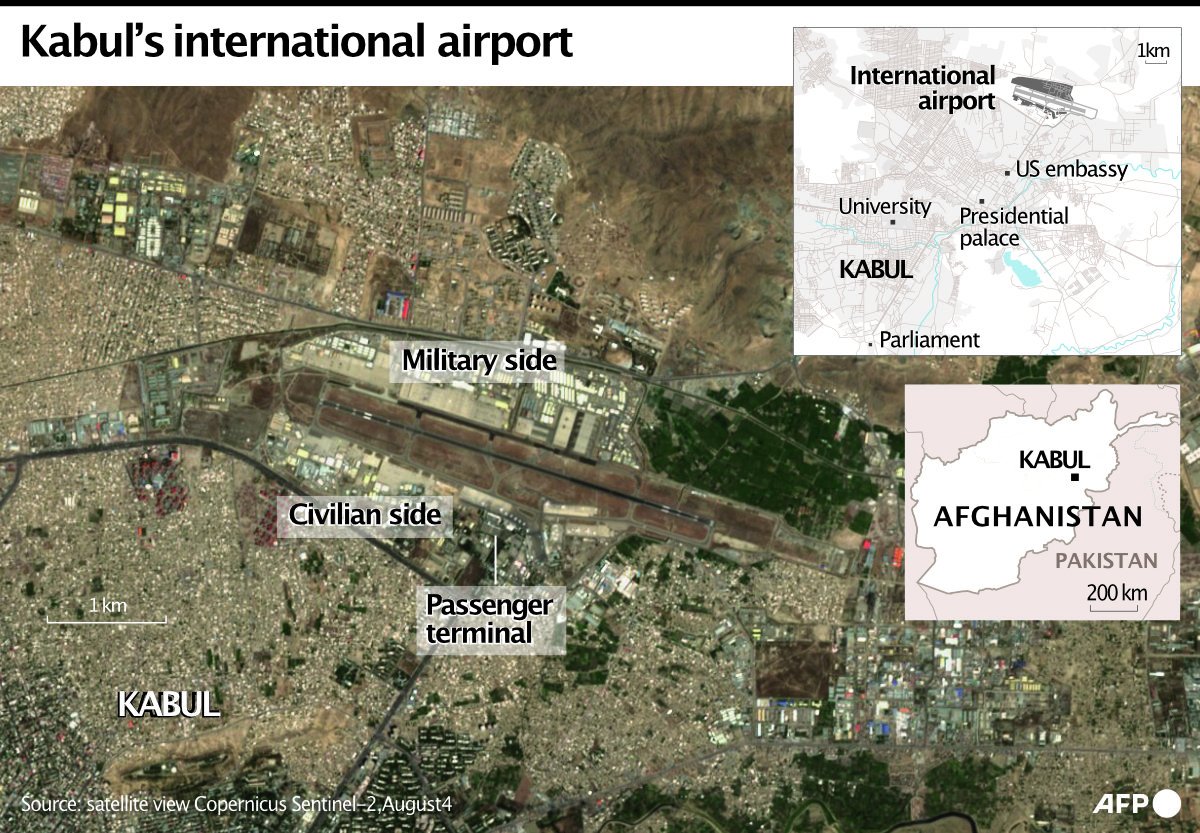
“All Afghanistan is secure, but the airport, which is managed by the Americans, has anarchy,” Amir Khan Motaqi, a senior Taliban official, said Sunday. The US “should not embarrass itself to the world and should not give this mentality to our people that (the Taliban) are a kind of enemy.”
Speaking to an Iranian state television channel Saturday night in a video call, Taliban spokesman Mohammad Naeem also blamed the deaths at the airport on the Americans.
“The Americans announced that ‘we would take you to America with us,’ and people gathered at Kabul airport,” Naeem said. “If it was announced right now in any country in the world, would people not go?”
Moderate image
The Taliban have sought to project a more moderate image than when they last ruled the country, from 1996 until the US-led invasion following the 9/11 attacks, which Al-Qaeda carried out while being sheltered by the Taliban. During their earlier rule, women were largely confined to their homes, television and music were banned, and public executions were held — all in accordance with the Taliban’s harsh version of Islamic rule.
This time, the Taliban are holding talks with Afghan officials from previous governments on a political transition and say they will restore peace and security after decades of war. Afghan officials familiar with the talks say the Taliban have said they will not announce a government until after the Aug. 31 deadline for the US troop withdrawal.
But they already face stirrings of resistance.
In Baghlan province, some 120 kilometers (75 miles) north of Kabul, fighters calling themselves the “People’s Uprising” claimed to have seized three districts in the Andarab Valley, nestled in the towering Hindu Kush mountains.
Khair Mohammad Khairkhwa, the former provincial head of intelligence, and Abdul Ahmad Dadgar, another leader in the uprising, said Taliban fighters had burned down homes and kidnapped children. Two other officials, who spoke on condition of anonymity, made similar allegations. The Taliban did not immediately respond to a request for comment.
In the nearby Panjshir province — the only one yet to fall under Taliban control — a group of militia leaders and officials from the ousted government have pledged to defend it against the Taliban, who circulated video showing their fighters heading toward the region.
The province is a stronghold of the Northern Alliance fighters who joined with the US to topple the Taliban in 2001, and Ahmad Massoud, the son of a famous Northern Alliance commander assassinated days before the 9/11 attacks, has appeared in videos from there.
But it appears unlikely a few thousand guerrilla fighters will soon succeed where the Afghan national security forces failed despite 20 years of Western aid, assistance and training.
“If Taliban warlords launch an assault, they will of course face staunch resistance from us,” Massoud said in an interview with the Al-Arabiya news network. But he also expressed openness to dialogue with the Taliban.
Continuing evacuation
The US Embassy, which has relocated to the military side of the airport, has told American citizens and others not to come to the airport until they receive precise instructions.
US National Security Adviser Jake Sullivan told CNN that 3,900 people had been airlifted out of Kabul on US military flights in the past 24 hours, up from 1,600 the previous day. That’s in addition to about 3,900 people airlifted on non-US military flights over the past 24 hours. It remains far below the 5,000 to 9,000 that the military says it has the capacity to airlift daily.
Britain said it had airlifted more than 5,000 people, including 1,000 in the last 14 hours.
US Defense Secretary Lloyd Austin activated the Civil Reserve Air Fleet program, requesting 18 aircraft from US carriers to assist in transporting Afghan refugees after they are evacuated to other countries. The voluntary program, born in the wake of the Berlin airlift, adds to the military’s capabilities during crises.
President Joe Biden has vowed to bring home all Americans from Afghanistan and to evacuate Afghans who aided the US war effort. US military helicopters have been used to collect 169 Americans from outside the airport. Tens of thousands of Americans and others are still hoping to fly out.
In Riyadh, the Organization of Islamic Cooperation said it would seek to help achieve peace in Afghanistan and to facilitate evacuation operations.
During an emergency meeting called by Saudi Arabia, Secretary-General Dr. Yousef bin Ahmed Al-Othaimeen called on the Taliban to respect international humanitarian law and the right to life and security.



